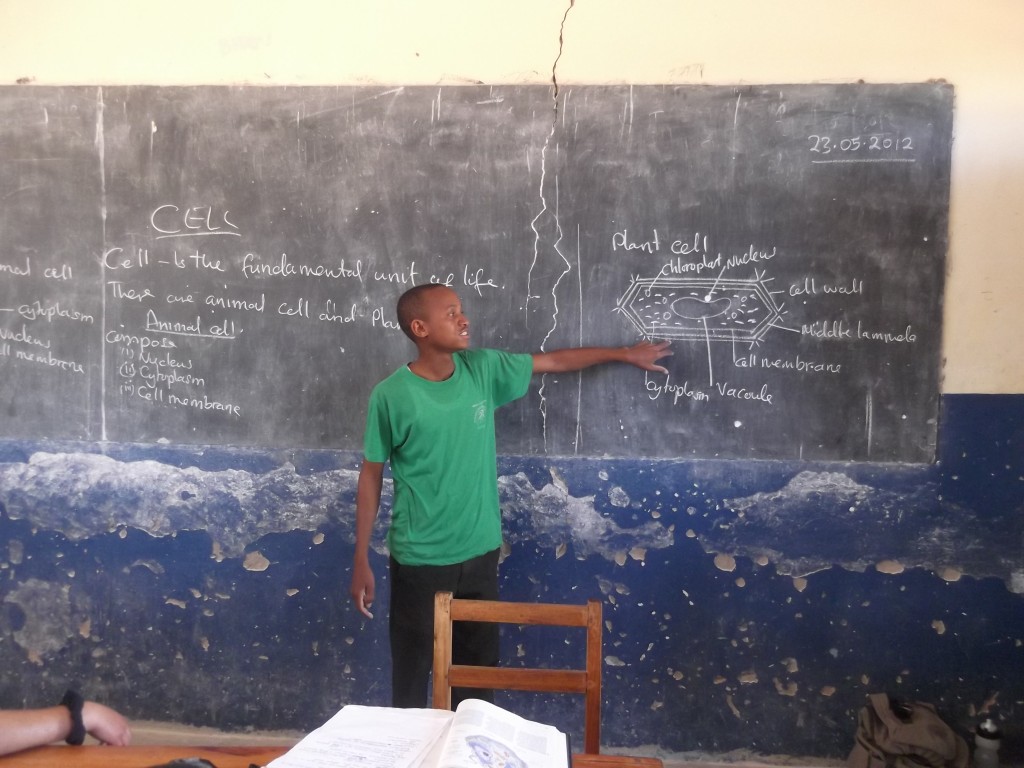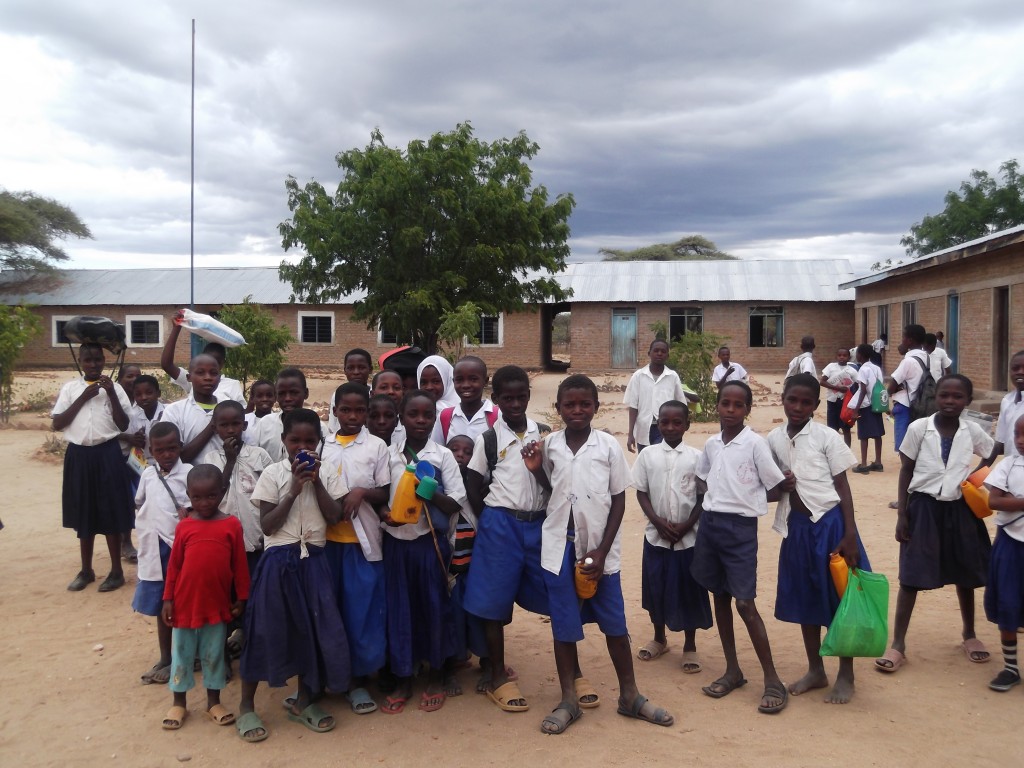I grew up thinking I wanted to be a veterinarian, and in some respects, I still do. But then after I turned 21, a small voice in my head started whispering, “what about teaching?” Teaching? What about teaching!? There is no way I would be good at that; I suck at talking in front of large groups of people! Still, that thought stuck with me through the end of college, although I didn’t change my major to fit this new interest. I figured I would never get a job in it since I had no experience, and settled in working as a veterinary technician of sorts. I loved that job, but a small part of me still wanted to be one of the many people who would play a small, yet key role in developing the mind of a young child. Then, serendipitously, I received an opportunity in my email that was impossible to pass up. Managing a project where one of the goals was to create an education program for the kids in school (and those who could not afford school) in Tanzania, a country I had fallen in love with a year before.
I jumped at the chance, anxious to get in the field and see what teaching was like in a foreign, developing country, and to see if it was something that I was even good at. What I have seen, and learned has been enlightening, sometimes surprising, fun and overall, wonderful. The majority of schools the volunteers have taught at are great schools, and make the best of what little resources they have. Classrooms consist of a cement room, with holes in the walls serving as doors and windows. In most primary schools, there aren’t any actual doors or window panes, just spaces serving as doors and windows. There are very few educational posters on the wall, if any, and if there are, it’s usually handwritten. There isn’t any electricity, and frequently, there are many students to one teacher. The secondary schools are nicer than this, but are still pretty basic. In the majority of schools, I sense that the students are urged to make the most of their education, and become leaders in their communities. The best example I have seen of this is at Pawaga Secondary School.
The students at this school are incredibly bright, and the teachers are incredibly enthusiastic about sharing their knowledge with them. I have had the pleasure of teaching at this school, and I couldn’t have asked for a better class for my first time teaching. A week before I taught them for the first time, I was sitting in the headmaster’s office, discussing with him and the vice headmaster our goal, and what subjects we would be teaching. They mentioned they really needed help with biology, so I said, hey, that’s what I majored in at Colorado State, so I may as well share some of that knowledge I learned with the students here, I would love to teach biology (something I never thought I would EVER think)! A week later, I walked in to a class of close to fifty 16-18 year olds (in a very small room) with my lecture notes on basic cell biology and anatomy in my hand. Surprisingly, I was not nervous at all. I thought I would get up in front of the class, and then not be able to speak. But I could see their desire to learn and the look of excitement in their eyes at the prospect of being taught by a mzungu (white person) and felt very at ease. The day before, the headmaster had told me that he was not sure if they had a lesson on cell biology, but he thinks that they have. I took a chance and created a lecture anyway. When I asked the class if they had a lesson on cell biology, they said yes. Uh oh! I had no alternative lecture planned. So instead, I improvised a little bit and asked for a volunteer to come up to the front and teach ME instead. And that way the class would get a good review as well. Happily, I got a volunteer to come up. And what followed amazed me. This young teen, came up to the front of the class, and launched into a mini lecture of cell anatomy, including the key differences between animal and plant cells, complete with diagrams (which were better than I could ever draw), in fluent English! I was so proud, even though I had never seen these kids before.
The student did a great job; however, he had only taught about the very, very basic anatomy of the cell (nucleus, cytoplasm, and cell wall) and did not go into the function of each. This is where I took over. I told the class that they had a great understanding of this topic, but that I was going to expand a lot more on it. There is a whole lot more to cells than what they were taught, and I was eager to share it with them. After I had finished my lecture, and answered several questions from the class (who seemed very intrigued with what they learned) I looked up to see the headmaster at the door beaming. He took me outside and told me that I was a WONDERFUL teacher, that he had learned so much that he had never known and that he wants me to come back. This reaction surprised me. I was somewhat shocked that the level of detail I had taught was not common knowledge, and it was still very basic cell biology! The equivalent in the states is taught in very early high school and these kids were at the end of the schooling. It also made me a little bit sad. But more so, I was thrilled to have been able to teach everyone something new, and yearned to do it again. I now have a reserved spot at Pawaga Secondary School on Saturday mornings, teaching biology.
Not only was it wonderful to teach, it’s been equally as amazing to observe teaching sessions with the other volunteers in other schools in the Iringa region. As an observer, I can REALLY watch the students as they learn, and put the pieces of what they are learning together when the teachers in our organization ask them questions about the lecture they are giving. It also helps me as a developing teacher to see the methods they use to demonstrate points. Games usually are best at getting the class to understand a point. My favorite is the “competition game”. A game sort of like tag, developed by Rachel and Erin to demonstrate the effect of heavy competition in Ruaha National Park. The kids just love this! The whole room erupts in laughter every time. It really warms my heart to see a huge room of Tanzanian kids smiling.
This experience has been unforgettable, and I look forward to the next 3 months as we continue to develop the education program. I really love being a part of the schooling of young students. Knowledge is power, especially in an environment such as this. With a good education and a committed mind, the young generation can do such great things for the community, and I am so thankful for my university education which has given me extensive knowledge that I can pass on to others. I hope this experience will help launch me into what I believe (at this point in my life at least) will be my dream career of being a naturalist at a youth camp somewhere in Colorado’s Rocky Mountains.
Asante kwa kusoma! (Thank you for reading!)
Leah




